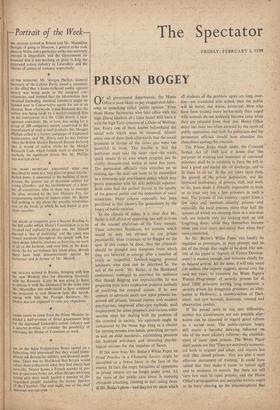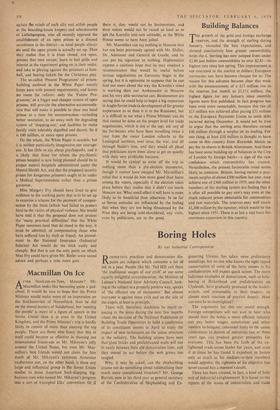PRISON BOGEY
OF all government departments, the Home Office is most likely to pay exaggerated defer- ence to something called 'public opinion.' Even those Home Secretaries who take office with the high liberal idealism'of a John Stuart Mill leave it with the high Tory cynicism of a Duke of Welling- ton. Every one of them knows beforehand the social evils which must be removed. Almost every one of them finds afterwards that the social pressures in favour of the status quo were too powerful to resist. The trouble is that the politician must take the short view—he wants quick results in an area where progress can be visibly demonstrated within at most five years. The permanent official's vista stretches on -to retiring age—he does not want to be committed to a strenuous and unorthodox policy which may prove unpopular with his next politicial superior. Both sides find the perfect excuse in the apathy of the general public and the opposition of vocal minorities. Penal reform especially has been paralysed in this country for generations by the bogey of public opinion.
I n the climate of today, it is clear that Mr. Butler is still afrhid of appearing 'too soft' in front of the massed phalanxes of the Tory women. These suburban Boadiceas, for reasons which would be only too obvious to any prison psychiatrist, want criminals to be flogged on the spot. if this cannot be done, then -the criminals should be plunged into dungeons from which they are believed to emerge after a number of years as respectful, forelock-tugging manual labourers who then can be described as 'the• salt of the earth.' Mr. Butler, at the Blackpool conference, managed to convince his audience that though flogging was impracticable, he was preparing even more unpleasant punitive methods of pacifying the criminal masses. • If he now appears to advocate more new open priSons, im- proved old prisons, remand centres with resident psychiatrists, improved after-care methods, paid employment for some prisoners and various other sensible steps for dealing with the problem of the criminal in society, his approach might be caricatured by the Stone Age wing as a charter for turning prisons into hotels, providing servants to wait on child murderers, establishing pensions for habitual evil-doers and inventing psycho- logical excuses for the impulses of Satan.
If this were true, Mr. Butler's White Paper on Penal Practice in a Changing Society might be described as a brave foray in the face of the enemy. In fact, the angry battalions of opponents to prison reform are no longer under arms. All the mass of the public care 'about: is stopping criminals attacking, robbing or defr,tuding them. If Mr. Butler's plans—and they are tti■ plans which all students of the problem agree are long over- due—are translated into action, then the public will be better, not worse, protected. Men who have been treated more barbarously than caged wild animals do not suddenly become tame when they are released from their zoo. Home Office delay has been too often excused by the myth of public opposition, and both the politicians and the permanent officials should now abandon this threadbare apology for inaction.
The Prison Rules made under the Criminal Justice Act of 1948 laid it down that 'the purposes of training and treatment of convicted prisoners shall be to establish in them the will WI lead a good and useful life on discharge, and to fit them to do so.' In, the ten years since then, the growth of the prison population, and the increased inadequacy of prisons, staff, and work to do, have made it virtually impossible to train or to treat any but a few prisoners in such a way. The prisons of this country--apart from a few open and 'medium security' prisons—and especially the local prisons, more than half the inmates of which are sleeping three in a one-man cell, are suitable only for locking men up and forgetting them; while they themselves become bitter and even more anti-social than when they were committed.
So Mr. Butler's White Paper can hardly be regarded as premature, or even prompt, and its list of the things that ought to be done (the sub- title of the paper is 'Aspects of Future Develop- ment') is modest enough, and welcome chiefly for its belated arrival. All the same, it will take some ,£40 million (the experts suggest), spread over the next ten years, to complete the White Paper's `Future Programme' of security prisons for at least 1,800 prisoners serving long sentences; a security prison for dangerous prisoners; an alter- native to Holloway; a reconstruction of Dart- moor; and new borstals, detention, remand and observation centres. - If the pound were to run into difficulties, neither this Government nor any possible alter- native can be expected to regard penal reform as a sacred trust. The public-opinion bogey still exerts a harmful delaying influence on one of the most salutary reforms—the establish- ment of more open prisons. The White Paper itself points out that 'They are extremely economi- cal both to acquire and adapt, and require less staff titan closed prisons: they are also a most effective instrument of training.' It could have added that they make it easier to recruit staff and to maintain its morale. But there are still very few men in open prisons, and the Home Office's propagandists and pamphlet-writers ought to be kbusy clearing up the misconceptions that agitate the minds of such silly and selfish people as the boarding-house keepers and schoolmarms of Littlehampton, who, all recently opposed the establishment of an open prison at a disused aerodrome in the district—as local people always do until the open prison is actually set up. Then they realise that it is from closed, not open, prisons that men escape; learn to feel pride and interest in the experiment going on in their midst; and take to playing against the prisoners at foot- ball, and buying tickets for the Christmas play.
The so-called 'Present Programme' of prison- building outlined in the White Paper' merely keeps pace with present requirements; and leaves no room for reform; only the 'Future Pro- gramme,' or a bigger and cheaper system of open prisons, will provide the alternative accommoda- tion that will make it possible to clear one local prison at a time for reconstruction—including better sanitation, to do away with the degrading system of 'slopping-out,' and facilities to make family visits tolerably dignified and decent. So it is £40 million, or more open prisons.
On the whole, the White Paper is sensible, but it is neither particularly imaginative nor courage- ous. It has little to say about psychopaths, and it is likely that those for whom the psychiatric prison hospital is now being planned should be in proper mental hospitals administered under the Mental Health Act, and that the proposed security prison for dangerous prisoners ought to be under a Medical Superintendent rather than a . prison governor.
Miss Margery Fry should have lived to give evidence to the working party that is to be set up to examine a scheme for the payment of compen- sation by the State (which had failed to protect him) to the victim of physical violence. She would have told it that the proposal does not present the 'many practical difficulties' that the White Paper mentions (and that do stand in the way, it must be admitted, of compensating those who have suffered loss by theft or fraud). An amend- ment to the National Insurance (Industrial injuries) Act would do the trick easily and cheaply. But that is not the only point on which Miss Fry could have given Mr. Butler sonic sound advice and perhaps a mite more guts.







































 Previous page
Previous page